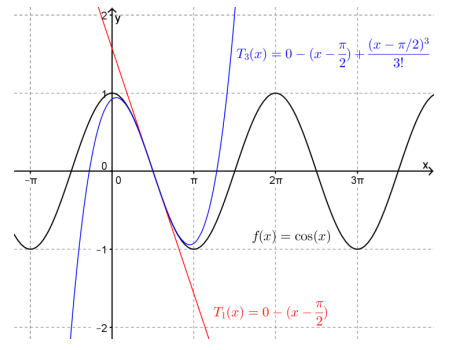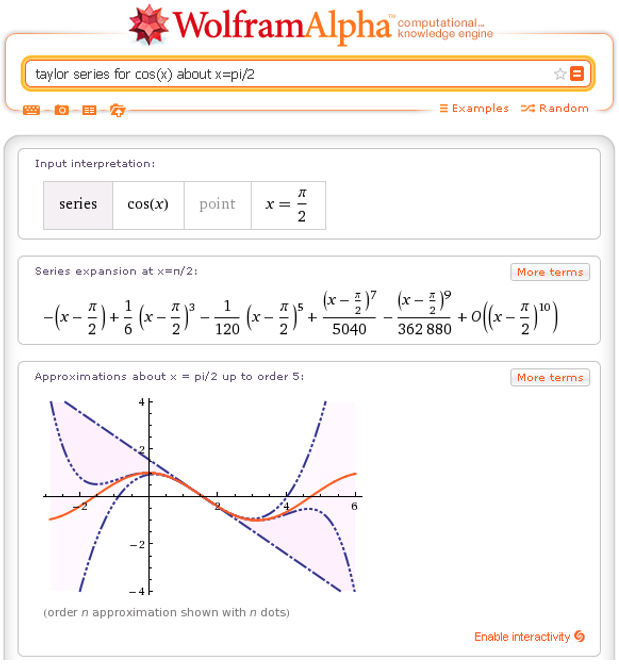Section 2.2 Taylor Series
Maclaurin series are power series about \(x=0. \) However we can follow exactly the same process to find a power series expansion for a function \(f(x) \) about any point \(x=a. \) We call these power series Taylor Series.
Definition 2.2.1. Taylor Series.
The series,
is called the Taylor series for \(f(x) \) about \(x=a. \)
Note that:
We can construct the Taylor series about \(x=a. \) for any function that is infinitely differentiable at \(x=a. \)
The Taylor series for \(f\) about \(x=a \) always converges to \(f(a)\) at \(x=a. \)
If the Taylor series converges for other values of \(x \) these will be in an interval centred on \(x=a. \)
It is possible that a Taylor series may converge to a value other than the function value.
A Maclaurin series is just a Taylor series about \(x=0. \)
The \(n^{\text{th}} \) partial sum of the Taylor series for \(f \) about \(x=a \) is called the \(n^{\text{th}} \) degree Taylor polynomial for \(f \) about \(x=a. \)
Example 2.2.2.
Find the Taylor series for \(f(x)=\cos(x) \) about \(x=\frac{\pi}{2} \)
Answer.\(\displaystyle\sum_{k=1}^{\infty}(-1)^{k}\dfrac{(x-\frac{\pi}{2})^{2k-1}}{(2k-1)!}\)
In order to find the Taylor series for \(f(x)=\cos(x) \) about \(x=\frac{\pi}{2} \) we need to evaluate \(f \) and its derivatives at \(x=\frac{\pi}{2}. \) So,
Thus the Taylor series for \(f(x)=\cos(x) \) about \(x=\frac{\pi}{2} \) is
It turns out that this series converges to \(f(x)=\cos(x) \) for all values of \(x. \) Figure 2.2.3 shows the graph of \(f(x)=\cos(x) \) and the Taylor polynomials of degree \(1 \) and degree \(3 \) about \(x=\frac{\pi}{2} .\)

Example 2.2.4.
Find the second order approximation to \(f(x)=e^{-\frac{x}{3}} \) about \(x=2. \)
Answer.\(T_{2}(x)=e^{-\frac{2}{3}}-\dfrac{1}{3}e^{-\frac{2}{3}}(x-2)+\dfrac{1}{18}e^{-\frac{2}{3}}(x-2)^{2}\)
In order to find the second order approximation for \(f(x)=e^{-\frac{x}{3}} \) about \(x=2 \) we need to evaluate \(f \) and its first two derivatives at \(x=2\text{.}\) So,
Thus the second order approximation for \(f(x)=e^{-\frac{x}{3}} \) about \(x=2, \) (or the Taylor polynomial of degree \(2, \) for \(f(x)=e^{-\frac{x}{3}} \) about \(x=2\)), is
Example 2.2.5.
Find the Taylor polynomial of degree \(4 \) for \(f(x)=x\cos(x) \) about \(x=\frac{\pi}{2}. \)
Answer.\(T_{4}(x) = -\dfrac{\pi}{2} (x-\dfrac{\pi}{2}) - (x-\dfrac{\pi}{2})^2 + \dfrac{\pi}{2} \dfrac{(x-\dfrac{\pi}{2})^3}{3!} + \dfrac{(x-\dfrac{\pi}{2})^4}{3!}\)
Since we already know the Taylor series for \(\cos(x) \) about \(x=\frac{\pi}{2} \) we can obtain the \(4^{\text{th}} \) degree Taylor polynomial for \(f(x)=x\cos(x) \) about \(x=\frac{\pi}{2} \) as follows
Thus the \(4^{\text{th}} \) degree Taylor polynomial is
Exercises Example Tasks
1.
Find the Taylor series for \(f(x)=\ln(x). \) about \(x=e. \)
2.
Find the Taylor polynomial of degree \(3 \) for \(f(x)=\dfrac{1}{1-x} \) about \(x=2. \)
3.
Find the Taylor polynomial of degree \(4 \) for \(f(x)=x\ln(x) \) about \(x=e. \)
4.
Find the \(3\)rd degree Taylor polynomial for \(f(x)=x^2 e^{x} \) about \(x=1. \)
Remark 2.2.6. A little remark.
Computer algebra systems usually have commands for Taylor series. For example, here in Figure 2.2.7 is an example of a query to Wolfram Alpha that will work.
